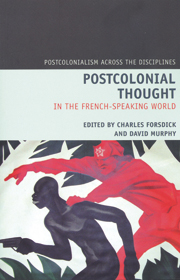Book contents
- Frontmatter
- Contents
- Acknowledgements
- Introduction: Situating Francophone Postcolonial Thought
- Section 1 Twelve Key Thinkers
- 1 Aimé Césaire and Francophone Postcolonial Thought
- 2 Maryse Condé: Post-Postcolonial?
- 3 Jacques Derrida: Colonialism, Philosophy and Autobiography
- 4 Assia Djebar: ‘Fiction as a way of “thinking”’
- 5 Frantz Fanon: Colonialism and Violence
- 6 Édouard Glissant: Dealing in Globality
- 7 Tangled History and Photographic (In)Visibility: Ho Chi Minh on the Edge of French Political Culture
- 8 Translating Plurality: Abdelkébir Khatibi and Postcolonial Writing in French from the Maghreb
- 9 Albert Memmi: The Conflict of Legacies
- 10 V. Y. Mudimbe's ‘Long Nineteenth Century’
- 11 Roads to Freedom: Jean-Paul Sartre and Anti-colonialism
- 12 Léopold Sédar Senghor: Race, Language, Empire
- Section 2 Themes, Approaches, Theories
- Notes on Contributors
- Bibliography
- Index
12 - Léopold Sédar Senghor: Race, Language, Empire
from Section 1 - Twelve Key Thinkers
- Frontmatter
- Contents
- Acknowledgements
- Introduction: Situating Francophone Postcolonial Thought
- Section 1 Twelve Key Thinkers
- 1 Aimé Césaire and Francophone Postcolonial Thought
- 2 Maryse Condé: Post-Postcolonial?
- 3 Jacques Derrida: Colonialism, Philosophy and Autobiography
- 4 Assia Djebar: ‘Fiction as a way of “thinking”’
- 5 Frantz Fanon: Colonialism and Violence
- 6 Édouard Glissant: Dealing in Globality
- 7 Tangled History and Photographic (In)Visibility: Ho Chi Minh on the Edge of French Political Culture
- 8 Translating Plurality: Abdelkébir Khatibi and Postcolonial Writing in French from the Maghreb
- 9 Albert Memmi: The Conflict of Legacies
- 10 V. Y. Mudimbe's ‘Long Nineteenth Century’
- 11 Roads to Freedom: Jean-Paul Sartre and Anti-colonialism
- 12 Léopold Sédar Senghor: Race, Language, Empire
- Section 2 Themes, Approaches, Theories
- Notes on Contributors
- Bibliography
- Index
Summary
Since the beginning of the new millennium there has been a remarkable turnaround in the critical appraisal of the life and work of Senegalese poet-president, Léopold Sédar Senghor, the writer most closely associated with the Francophone literary movement of Negritude. In the course of the preceding decades, Senghor had come to be seen by numerous critics (if by no means all) as an anachronistic figure, whose ideas had served their time and were no longer useful in thinking about Africa. The high point of the more recent positive reappraisal came in 2006 (the centenary of his birth), which l'Organisation Internationale de la Francophonie – an organization of which the Senegalese writer is considered by many to be the founding father – had decreed to be L'Année Senghor (The Year of Senghor). Major (and minor) French publishers rushed to repackage and reissue existing material on Senghor, including a new edition of his collected poetry (Senghor, 2006), updated editions of critical works (Guibert and Nimrod, 2006), and translations of work previously published in English (Vaillant, 2006); and also to commission new (and often hagiographic) studies by former colleagues and acquaintances (see, in particular, Bourges, 2006; Brunel et al. 2006; Mémoire Senghor, 2006; Njami, 2006; Roche, 2006). In the course of the year, this led to the publication of well over 20 volumes that dealt with his career as poet, politician and theorist. (This Senghormania extended to the publication of a volume in his honour by a collective of cartoonists from Burkina Faso: see Senghor, cent ans, 2006).
- Type
- Chapter
- Information
- Postcolonial Thought in the French Speaking World , pp. 157 - 170Publisher: Liverpool University PressPrint publication year: 2009

